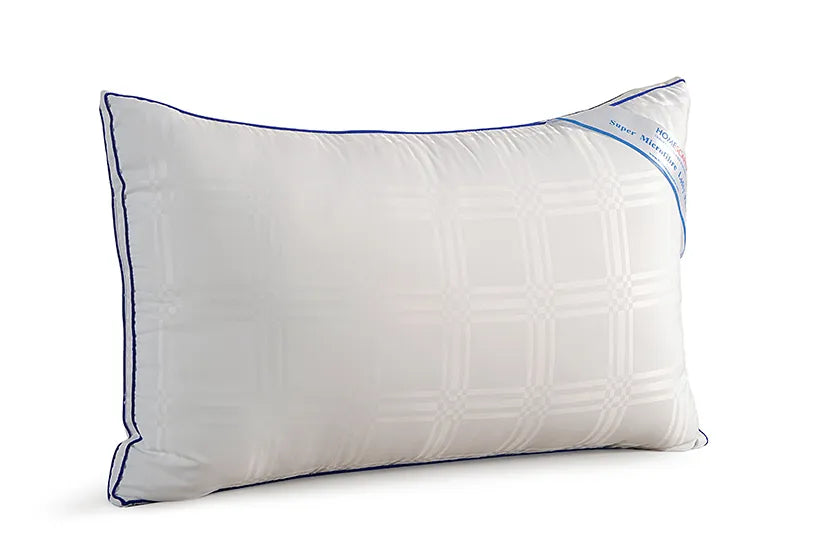Finding the perfect pillow is crucial for achieving quality sleep and waking up refreshed and rejuvenated. With the multitude of options available on the market, selecting the right pillow can be a daunting task. However, by understanding your specific needs, sleeping habits, and preferences, you can make an informed decision that promotes better sleep and overall well-being.
Factors to Consider When Choosing a Pillow
- Sleeping Position:Your preferred sleeping position significantly influences the type of pillow that will provide optimal support and comfort. Whether you're a back, side, or stomach sleeper, selecting a pillow that complements your sleeping position is essential for maintaining proper spinal alignment and reducing the risk of discomfort or pain.
- Material:Pillows come in various materials, each offering unique benefits in terms of support, comfort, and durability. Common pillow materials include memory foam, latex, down, and polyester. Understanding the characteristics of each material can help you determine which one best suits your needs and preferences.
- Firmness:The ideal firmness of a pillow depends on individual preferences and sleeping habits. While some may prefer a soft, plush pillow that cradles the head and neck, others may require a firmer pillow for adequate support and alignment. Assessing your comfort level and sleeping preferences can guide you towards selecting the right firmness for your pillow.
- Allergies:If you suffer from allergies, it's essential to choose a pillow that is hypoallergenic and resistant to dust mites, mold, and other allergens. Hypoallergenic pillows are crafted from materials that minimize allergic reactions, allowing you to sleep comfortably without compromising your health.
- Budget:Set a budget range before embarking on your pillow shopping journey to ensure that you find options that align with your financial constraints. While premium pillows may offer advanced features and luxurious materials, there are plenty of budget-friendly options available that provide adequate support and comfort.
Choosing the Right Pillow for Back Sleepers
Back sleepers require a pillow that maintains the natural curvature of the spine and provides sufficient support to the head and neck. Here are some key considerations when selecting a pillow for back sleepers:
- Medium Firmness: Opt for a pillow with medium firmness to ensure proper support without feeling too stiff or rigid.
- Contouring Support: Consider a neck roll pillow or cervical support pillow, such as those made of memory foam, which contour to the shape of the head and neck, providing personalized support and pressure relief.
- Thickness: Choose a pillow with medium thickness to prevent the head from tilting too far forward or backward, promoting neutral spine alignment and reducing the risk of discomfort or pain.
Choosing the Right Pillow for Side Sleepers
Side sleepers require a pillow that fills the space between the ear and shoulder to maintain proper alignment of the spine. Consider the following factors when selecting a pillow for side sleeping:
- Firmness and Loft: Opt for a firm pillow with high loft to adequately support the head and neck and prevent them from sinking too deeply into the pillow.
- Adjustability: Pillows with adjustable loft or fill allow side sleepers to customize the height and firmness according to their preferences and body size, ensuring optimal support and comfort.
- Contouring Ability: Look for pillows specifically designed for cervical support or neck pain relief, such as memory foam or latex pillows, which contour to the shape of the head and neck, providing targeted support and alleviating pressure points.
Choosing the Right Pillow for Stomach Sleepers
Stomach sleepers require a softer and flatter pillow to prevent excessive strain on the neck and maintain spinal alignment. Here's what to look for when choosing a pillow for stomach sleeping:
- Softness: Opt for a soft pillow, such as a feather pillow, that allows the head to rest comfortably without elevating it too high, which can strain the neck and cause discomfort.
- Low Loft: Choose a pillow with low loft or thickness to prevent the head from being pushed upward, promoting neutral spine alignment and reducing the risk of neck pain.
- Thin Profile: Look for pillows with a thin profile, such as down pillows, that help keep the neck in a neutral position, minimizing strain and allowing for easier breathing for stomach sleepers.
In conclusion, selecting the right pillow involves considering various factors such as sleeping position, material, firmness, and budget. By understanding your specific needs and preferences and exploring different pillow options, you can find the perfect pillow that promotes restful sleep and enhances your overall well-being. Don't hesitate to experiment with different pillow types and configurations until you find the perfect fit for your individual comfort and sleep preferences.
FAQ
- How do I know if I'm using the right pillow?
- You'll know you're using the right pillow if you wake up feeling refreshed and without any discomfort or pain in your neck or shoulders. Your pillow should support your head and neck in a neutral position, maintaining proper spinal alignment throughout the night.
- What's the best pillow material for sensitive skin?
- Hypoallergenic materials like latex or organic cotton are ideal for sensitive skin, as they are naturally resistant to dust mites, mold, and other allergens. These materials are gentle on the skin and promote a healthy sleep environment.
- Can using the wrong pillow cause neck pain?
- Yes, using the wrong pillow can cause neck pain and stiffness. A pillow that is too soft, too firm, or lacks proper support can result in misalignment of the spine and strain on the neck muscles, leading to discomfort and pain.
- Are memory foam pillows suitable for all sleeping positions?
- Memory foam pillows are versatile and can be suitable for various sleeping positions. However, individuals may prefer different loft and firmness levels based on their sleeping position and personal preferences.
- How often should I replace my pillow?
- It's recommended to replace your pillow every 1 to 2 years, depending on its condition and quality. Over time, pillows accumulate dust mites, allergens, and sweat, compromising their support and hygiene. Regular replacement ensures optimal sleep quality and comfort.













































